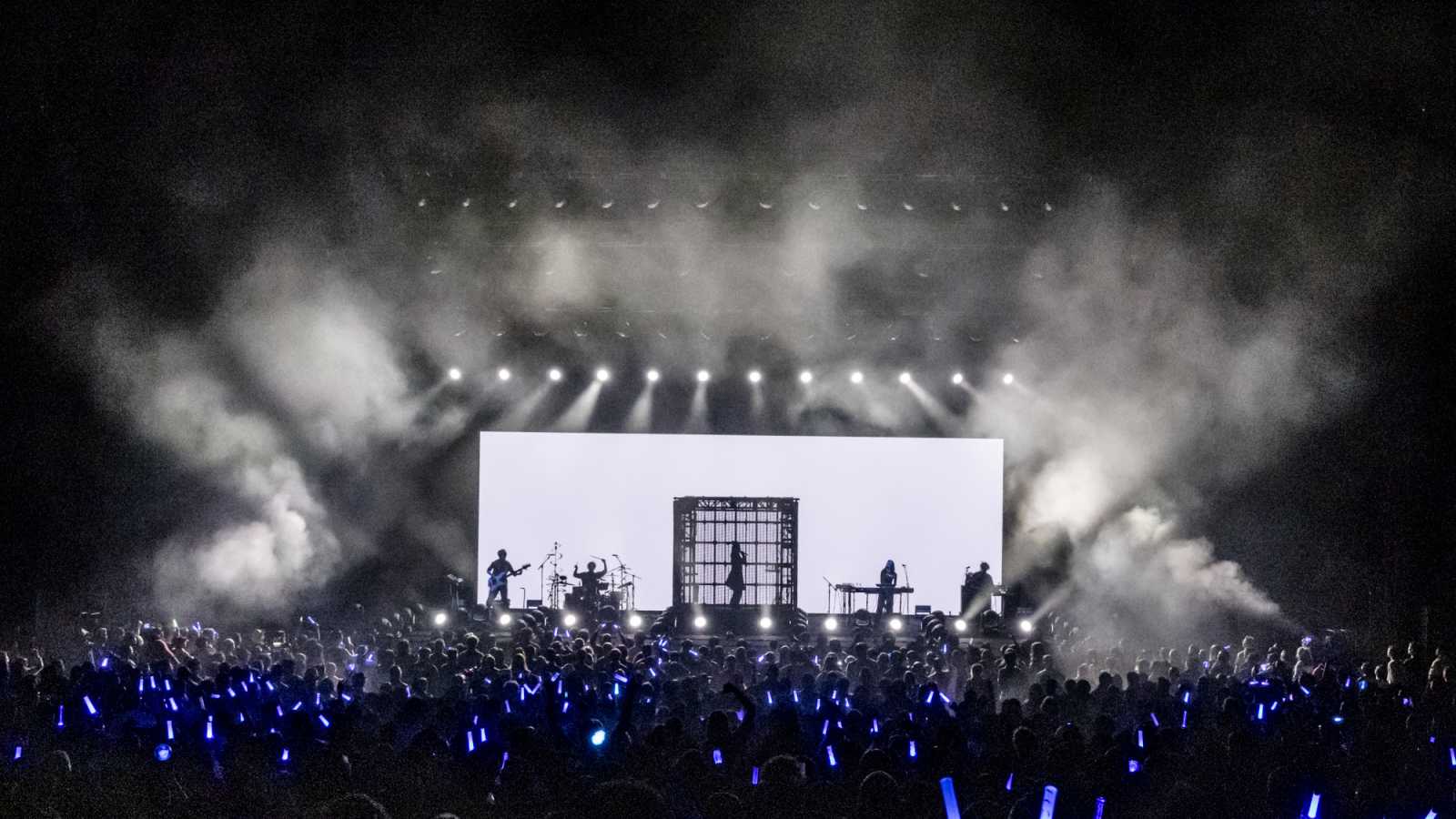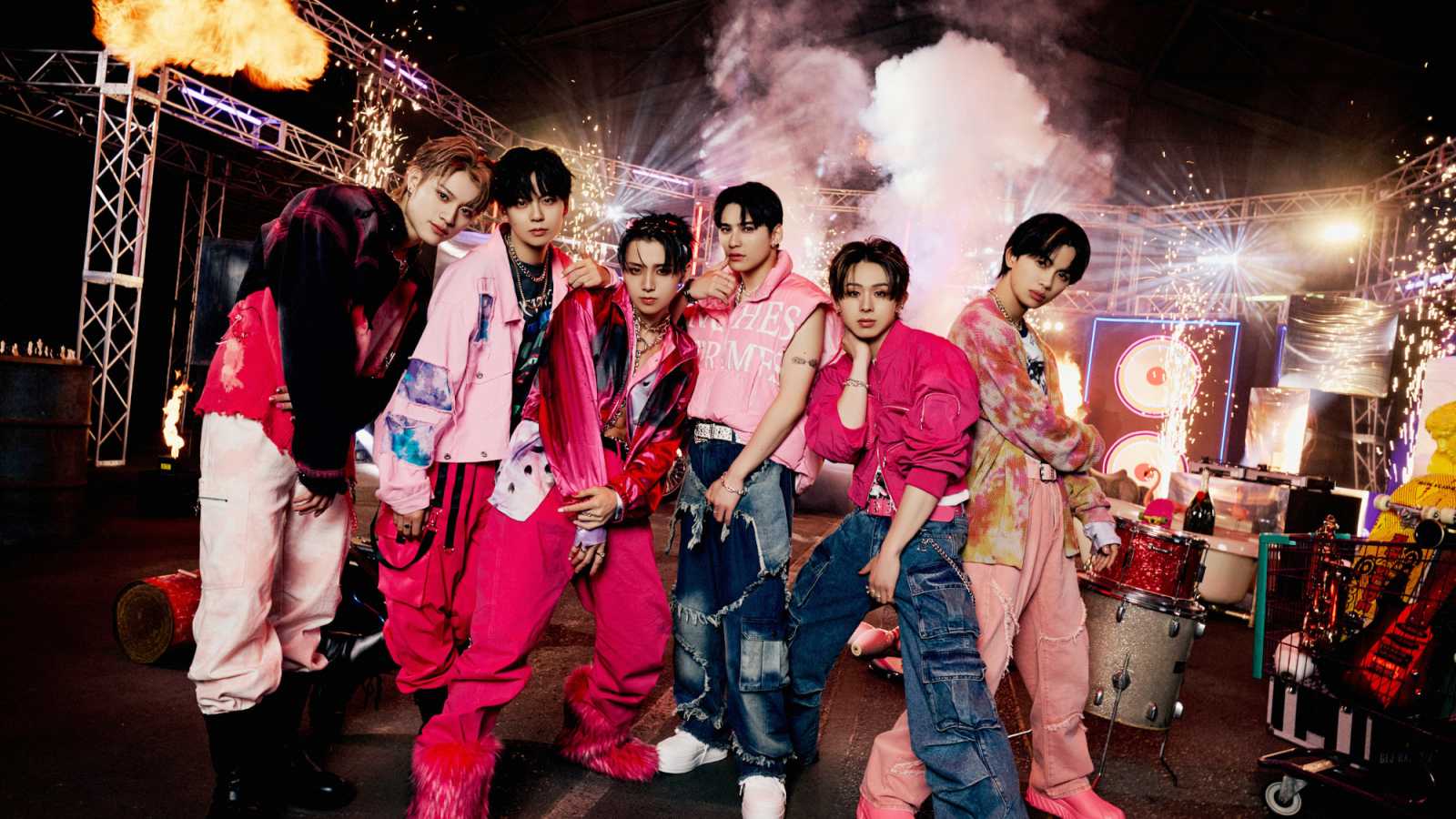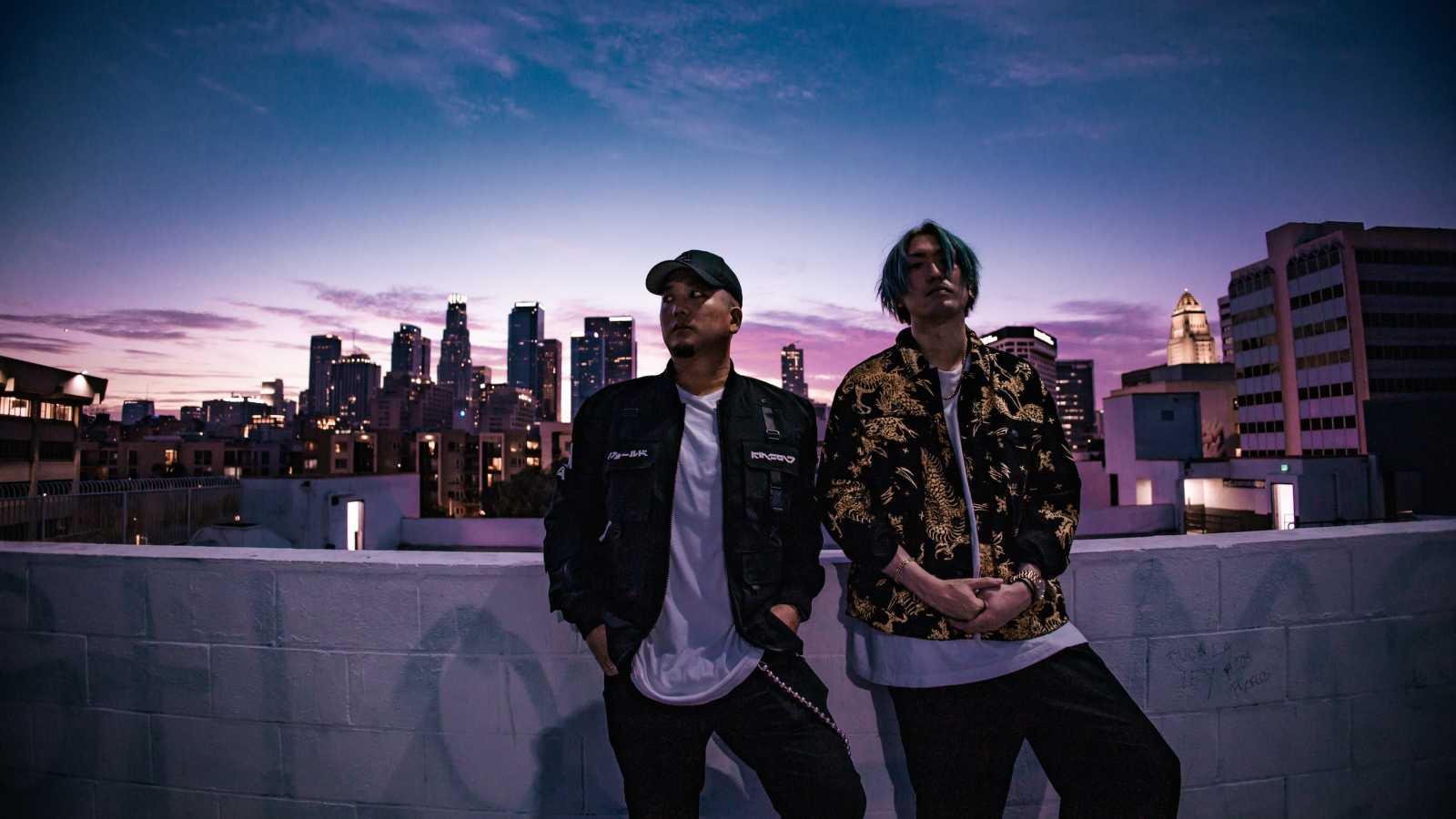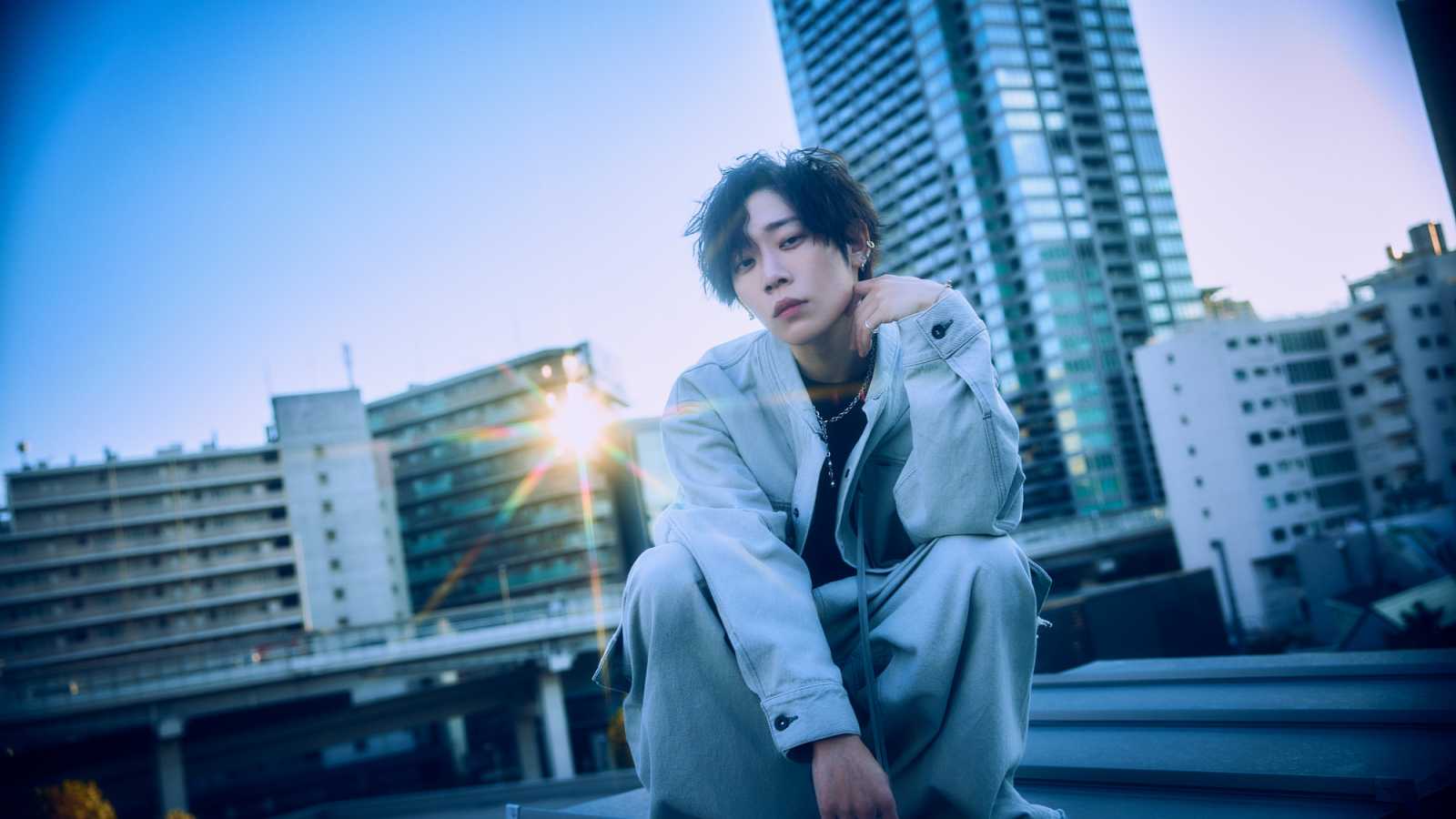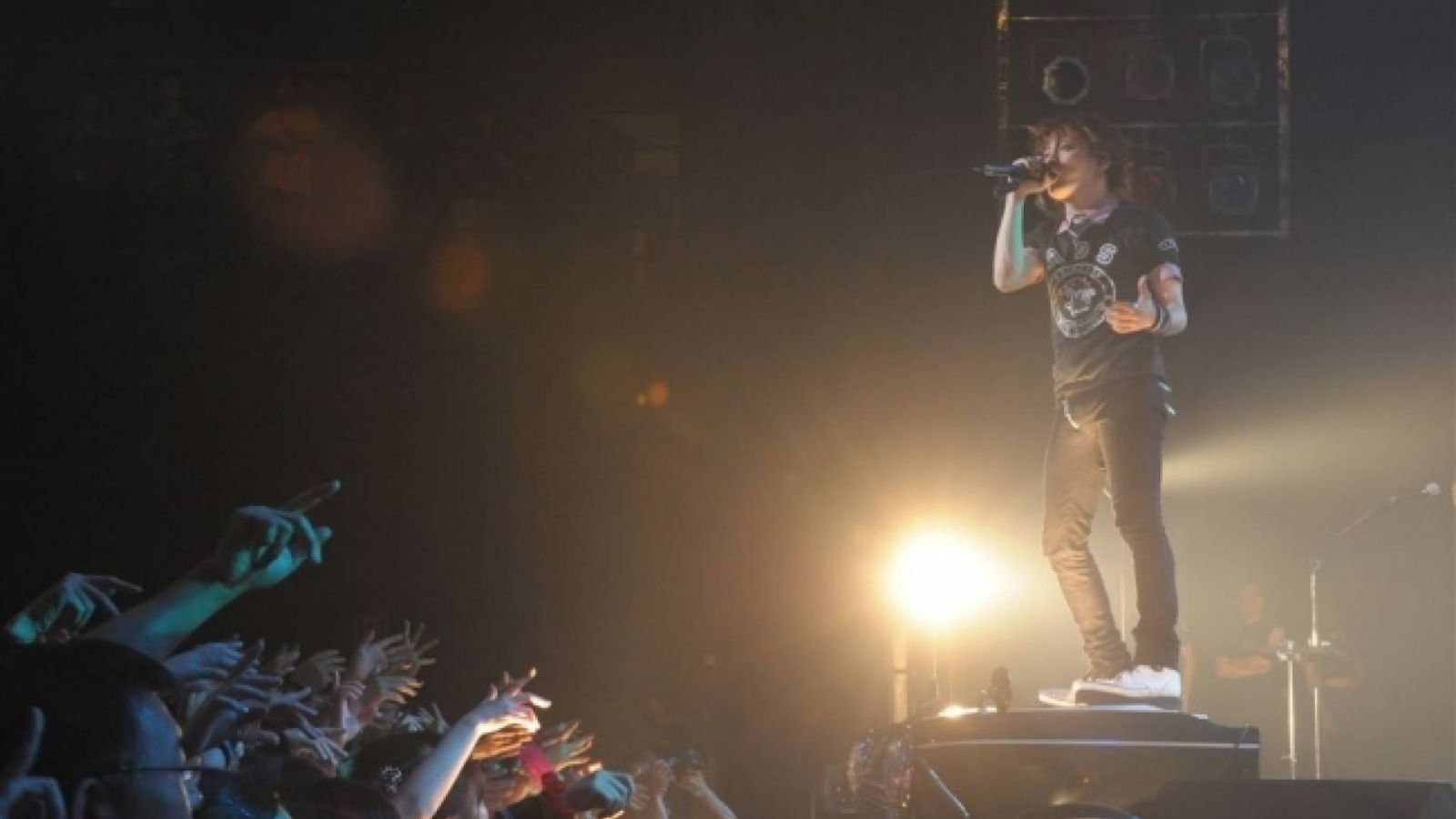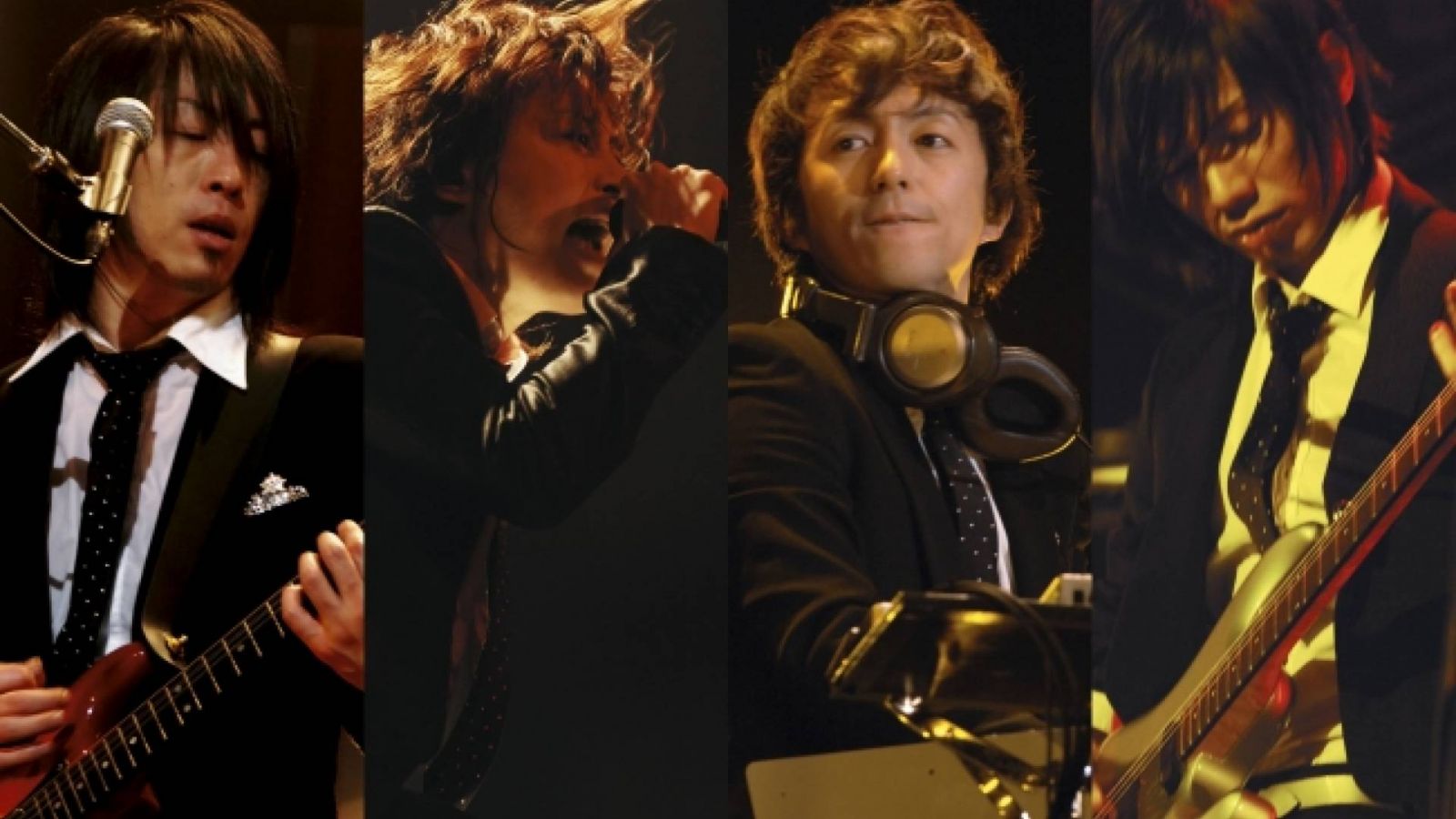abingdon boys school speaks about the origins, workings, and opinions of the ensemble.
Since their start roughly three years ago, abingdon boys school has been getting quite some attention. Not only because the band is fronted by vocalist T.M.Revolution, but also, and maybe especially, because of their incredibly catchy, pop-rock style and hard rock attitude.
This summer, the band released their first DVD, and a little later JaME sat down with the four band members for a very in-depth interview.
Please introduce yourselves for our JaME readers.
Nishikawa: I'm Nishikawa, vocalist of abingdon boys school.
SUNAO: I'm a guitarist, SUNAO. Nice to see you.
Shibasaki: I'm a guitarist, Shibasaki.
Kishi: I'm keyboardist and programmer, Kishi.
You previously met when working on the T.M.Revolution project, but please tell us about how the four of you originally met and what made you decide to create abingdon boys school.
Nishikawa: Well I first met SUNAO on the T.M.Revolution tour, and that was more than 10 years ago... or maybe it would be just 10 yeas ago now? Anyway, since then we have been working together on tours and in recordings. During that time, I was thinking about my musical roots, and wanted to see if there was something new I could do as a band. Through an acquaintance, I was introduced to Shibasaki, as I had liked his music.
Was it WANDS?
Nishikawa: After WANDS, he did al.ni.co. which was a unit. At that time I did a regular radio program in Japan called All Night Nippon, and played their songs recommending them to listeners. (laugh) But I was kind of frustrated, because they were not accepted so much by people. (laugh) But as I was always pushing them on the radio, it just happened that an acquaintance knew them, and so he introduced me. Then we started talking, we hit it off, so I asked him to join T.M.Revolution tours. Members gathered like that, and I thought I wanted to start something. At that time, the comic "NANA" became a movie, so there was talk about making something like a tribute to the comic, to bring more attention to the comic and the movie. Then tetsu, the bassist of L'Arc~en~Ciel suggested to us that we should do something, so we started working. At that time, we thought it was good timing, as we could really do something interesting. Kishi was a classmate of Shibasaki in music school. When we met for the first time, he gave me a demo tape and he told me, "Now I'm doing this kind of thing," and it was very impressive, then we talked and decided that we wanted to do that song. And the members who were with me on tour were...
Kishi: Us!
Nishikawa: Then we all met together in a recording studio. We often talked about how cool it would be if we three could do something together, so we forced Kishi-kun to join us in the recording studio. (laugh)
Have you wanted to do a band for a long time?
Nishikawa: Yes, but not only a band, I have always wanted to do something musical with everyone I get to know.
Instead of the usual line-up of vocalist, guitarist, bassist, drummer, you've chosen for a vocalist, two guitarists and a keyboardist. Why did you choose this line-up instead of the conventional one?
SUNAO: Um... It just happened that way. (laugh)
Nishikawa: And I know the ordinary band style where there is a drummer and a bassist for creating and keeping the rhythm, but we had a programmer already. So we didn't need a drummer and a bassist, and we want to do more work using loops and sequences in the future too, so it works well for us.
It's a new style.
SUNAO: In the genre of rock, it's a new style, I think.
Kishi: We are a band, there is no mistake about that.
SUNAO: I personally like drums, drum sounds and a drummer's playing. So we can freely choose what rhythm to use to match a song. Not so much right now, but I think that we have the ability to try out various things musically in the future.
I see. So you don't know yet what you will do musically from now on?
All: No.
Kishi: We might not change, but we might change. We like having that flexibility.
Nishikawa: You might think it strange but... band members may increase because of that. (laugh) Like "Hey, you finally joined too!?"(burst out laughing)
What's the concept of the band? The band name is from a British boys' high school.
Nishikawa: Yes. At first I was just playing with words. I was called Tabou as a child because my name is Takanori, and when I go overseas, I'm called 'turbo,' as it sounds similar. And I like motor sports too, so I use names that have something to do with motor sports in various things. Before I used the name abingdon boys school, I thought 'antilock brake system' which is called ABS for short, sounded good. (laugh) But it had no other meaning.(laugh)
SUNAO: So it meant just that, ABS.(laugh)
Nishikawa: So I thought about other names. We are the same generation, and we are like classmates gathering again to start a band. Then I looked over various books, and just happened to come across a boarding school called Abingdon School in Oxford, and I thought "Oh, that sounds good..." You know, Radiohead were classmates who gathered to make a band, and we were like them, so I thought "Let's do it too." (laugh)
Do you like driving cars?
Nishikawa: Yes, I do, and I like tampering with them, too.
In your live DVD, the stage set was a car.
Nishikawa: As we performed in live houses, it was a MINI Cooper, (laugh) but when we become bigger, we might change it for a Jaguar. (laugh) After an Aston Martin perhaps. (laugh)
Did you design this crown which looks like a school badge?
Nishikawa: Yes, we thought about the concept, and we imagined a boarding school. We pondered about designs, such as T-shirts and stuff, with a graphic design artist.
So it's totally your original?
Nishikawa: Yes, it is.
The four of you are already experienced musicians; please tell us the process of how you work together to develop your music and lyrics.
SUNAO: We all bring in songs on demo tapes, then we four members gather in a studio to actually play them, and we discuss things a lot.
Do you put the lyrics on last?
SUNAO: Yes. When we decide the composition and outline the details, we ask Nishikawa to make lyrics.
You bring demo tapes and gather to have a meeting, and select songs, right?
Kishi: Yes. With the sound, each member has his own territory, and we work on our own part while consulting with the other members like "Please do that; I'll take care of this."
Don't you have any clashes in opinions?
SUNAO: Yes, we do. We clash sometimes.
So there are things that you cannot back down on?
SUNAO: Well, we have the responsibility of our own part and each of us has confidence in what we do, so we clash sometimes. But we never break down like "I give up!" (laugh) We try to discuss what is good and try to make things better.
Nishikawa: To start a band again after getting older is quite hard physically, so I'm often asked "Why do you dare to do a band?". Each of us has had the experience of playing in a band and getting to the point of "No way!" "I can't stand this anymore!" (laugh) I think that it is because we have had these experiences that we can deal with such things, and be more flexible. For example, before, if one thing was rejected I would not have any other suggestions on what to do and I would say "It's this or nothing!" but now I say "Well what about this one?" I think that I deal with things differently now. There are more possibilities, so it's enjoyable in a way. I recommend it, although not everyone wants to work like that. (laugh)
Kishi: I think it's possible to work like that because we all have that extra bit of room we need to get things done. We trust each other too, like it is all right to leave the guitar parts to these two guitarists, or it is no problem to leave the vocal parts to Nishikawa-kun.
Can you put the lyrics on soon after you get the music?
Nishikawa: Oh, no... there are times when I really cannot decide on what to do. These three members make very unique music, and their personalities can be seen clearly with their experience. As I heard from Kishi that his background music was instrumental music called 'art-work,' it made me think "There aren't any vocals!" (laugh) But he has a sense of Japanese melodies, so emotional, internal lyrics fit his music better. SUNAO's music is like "I don't care about the details, but let's go wild!" (laugh) So, it is really interesting. Shiba's music is the most difficult! (laugh) He imagines Japanese lyrics, but I feel like putting English on all of the bass lines. (laugh) Usually Japanese lyrics feature a lot of consonants, but in his case the vowel sounds are really strong so I sometimes think "It is impossible to put lyrics in Japanese!" (laugh) However, when I force them in, I can make songs which have a different atmosphere, and those are interesting.
When you make music, do you decide the theme?
Shibasaki: Concretely speaking, I think that I put the essence of images into different places in the song, but I do not directly or clearly say the image using words. I like random English, and I put that in my demo tapes. I try Japanese too, but random Japanese can be difficult. (laugh) So I put in vocals with random English, so the image becomes what I want it to be.
Nishikawa: Yeah! I am easily drawn in by them. (laugh) He sings quite well. (laugh) Like I feel "Oh, it's quite good?". (laugh)
Kishi: I draw pictures. First of all, I draw a picture vaguely in my head, but I don't express it with my words, then I write songs as I imagine these four members.
When you work on new material, what is the goal for those songs? Do you think about what would sound better when performed live?
Nishikawa: Up until our 1st album, we just wanted to do what we wanted, but after our one-man tour at the end of February this year, I think we changed. We started to think more about what songs we wanted where, what kind of song we needed and how it would be interesting to try out different things.
Do you change your songs in your lives from your recordings?
Kishi: Basically, we do not change the arrangement, but we change the intro and ending to sound better on stage. And the small details change quite a lot too.
Nishikawa: These two... well they are guitarists...
SUNAO: We have only two guitars in our lives, so we have to think about how we mix or omit the parts played in our recording. But it generally turns out very well.
Do you ever use pre-recorded stuff in your lives?
SUNAO: Yes, we do that too.
Nishikawa: Just some parts, like noises and things. Basically, they keep playing all the time.
SUNAO: We try to play live in our live concerts.
Shibasaki: We extend or shorten the composition, but we haven't yet got to the point where we are tired of something and want to change the arrangement yet.
The arrangement can change as you play in lives.
Nishikawa: Yes. Maybe as Shibasaki said before, I think it depends on whether we get tired of playing something. However, aside from what we think, we have to consider the people who come to our lives to listen to that song, so I suppose it's a question of what we want to put first and foremost.
Kishi: I think that this is something we'll have to look at from now on. Now we just want to do what we want to, so we play just like our CD. However, if I think about how we reach the audience in lives, I want to try to do things like cutting phrases, or making other important phrases stand out more by cutting things out.
Considering most of your international fans do not understand Japanese, it seems that they are moved by the sound of your music with Nishikawa's voice...
Nishikawa: Hahaha! Yes, I guess they are... thanks! (laugh)
Is there a certain message you're trying to give your listeners? What are some of the themes your music revolves around?
Nishikawa: Um.... Let me think....
You look very happy in your live DVD.
Nishikawa: Yeah, that's the point. I said before how it can be interesting playing in a band after getting experience. I think there are various ways to find common ground between people; you know, the internet, e-mail and mobile phones are all part of that, but I think that participating in a band is also part of that. We can communicate things through what we do, I think. We four members have our own world, and we often look at our music over and over again. So before we can give happiness to people, it is important to be able to love the band, and the music that we do. In doing that I think we can make various things happen. Take a look at our lives and you can see just how much we like them and how we become one with the audience. Because of that, the audience keeps increasing. World peace through music may not sound that real, especially saying it from Japan, but we are all humans, and if we don't find a commonality as humans, there will always be troubles such as war. So, we want to show people how we enjoy music, and have them listen to our music and make them happy through it. Hopefully, it may have the effect of keeping their spirits up, and maybe one day we can go to their country and do a live there.
One can really feel that you are having fun.
Nishikawa: Well, to make people enjoy our music, we must first enjoy our own music.
You did a song for the tribute BUCK-TICK album with a cover of their song dress. How was it decided that you would be part of the tribute and why did you choose this particular song from the band's repertoire to cover?
Nishikawa: Before abingdon boys school, when I was about twenty years old, I was in a band, and at that time, I belonged to the same management office as BUCK-TICK. They were my so-called seniors, but quite a long time had passed, and I was invited for the 20th anniversary of BUCK-TICK. They took care of me often, but I hadn't yet returned the favor, so I told the members about that opportunity, and then the members told me "Of course we'll do it!" and we decided which song would be better. Let me see... what was the reason we selected it?
Kishi: I listened to songs of BUCK-TICK too, but far less than Nishikawa-kun, and I listened to various remixes of dress. I liked it quite a lot, the original song as well as the remix. I was thinking, vaguely, that it would be interesting if other songs could be like that. But it was a song made by Hoshino, so I wondered why it wasn't one of their main songs, but Nishikawa-kun said maybe that's a good thing. I thought the melody line of this song had a sad feeling, which was great, and I thought we could make it into something dramatic.
Nishikawa: I thought that maybe many people would like to play songs made by another guitarist; Imai has lots of singles released, and I have strong impressions about dress and JUPITER, both of which were made by Hoshino incidentally. JUPITER was the song I really wanted to do, but its impression on me was too strong. I liked the original song too much, so I couldn't really touch it. (laugh) Then I thought dress would be interesting to play.
How did you actually do it?
Shibasaki: The original song had quite a good melody, so we could do various things with it.
Nishikawa: Yes, and the original song seemed to be more of a sequence without typical guitar phrases or rhythm.
SUNAO: The version I heard didn't have guitar sounds.
Was it hard to put guitar sounds into it?
SUNAO: No, on the contrary, I was able to do it freely, as I had nothing in the way and I didn't have to think like "I should leave here", or "I should change here".
Shibasaki: I think it's quite difficult to get over the original song, but I wanted to make it to be like it was an original.
Speaking of cover songs, if you had the chance to do a similar project, but a tribute to abingdon boys school, what songs would you like to see covered and in what kind of style?
All: Ohhhh! (laugh) Ahhhhhh, I see.
SUNAO: I want to see how all the songs would turn out. With tuning, HOWLING is the most special for me, so I want to see how it would change, I think.
Would you want it to change totally?
Kishi: I want our songs to be organic. Our music is full of electric elements, so it would be interesting if it was organic, such as bossa nova or something. I don't think we could do it, as we would become too hot about it.
Nishikawa: Let's see... there is a song Desert Rose, which is the answer song to DOWN TO YOU. Desert Rose is constructed solely as the sequel to the story of DOWN TO YOU. So, it would be interesting to have twin vocals of male and female, and how can I say... it would also be interesting to sing together, like a female singer with a male rapper or male singer with female rapper, as that's not so common in Japan yet.
Shibasaki: That's a good idea. (laugh)
Nishikawa: Oh, yeah, that is a pretty good idea. (laugh)
SUNAO: I think we can do it. (laugh)
Nishikawa: Well, we talked about that before. (laugh) We have wanted to play with a guest.
Your music would change if a female vocalist were to join you.
Nishikawa: Well, we four members play sessions with various musicians. Actually, we invited a guest musician in this live DVD and our album. Now we're doing it only in Japan, but we want to play with foreign artists in the future.
You can be quite flexible. Maybe you can invite a percussionist.
Nishikawa: Yes.
Last year, you performed at "Live Earth," which is an event to combat climate change. The event took place at various locations worldwide and was hugely promoted by the international media. What was it like for you to perform in this event?
Nishikawa: Honestly speaking, for foreign events such as in London or in the U.S., their concepts were clear and the awareness of the audience was also high, so the event went well even though the theme was a little difficult about ecology and the earth's environment. However, the event in Japan was just like a music event.
Kishi: Yes. It was just like musicians doing their thing on stage one after another.
Wasn't it like everyone doing the live together?
Nishikawa: We didn't play with other artists at all, and the bands selected for the event were... kind of mismatched perhaps. We wanted to be really enthusiastic for such a good event, but it was a little bit of shame that we felt we couldn't send that message to everyone.
Kishi: It was like that back stage too. The dressing rooms were separated, even though we were in the event together.
It was really Japanese-like. (laugh)
Nishikawa: That's right! Very Japanese-like! (laugh) So, after we finished our turn, we connected to the internet and watched the relay broadcast overseas while we watched TV in Japan, too. The overseas events looked so fun!
Nishikawa: The foreign people who came seemed to enjoy themselves. In Japan, it seemed like the fans of each artist enjoyed themselves but the purpose of the event was not really stated that clearly.
Kishi: Yeah, that's right. There wasn't much exchange between artists.
I remember the last part of the hide memorial summit (Memorial event for hide which was held in Ajinomoto Stadium in May of 2008). It was great because almost all the artists joined one another on stage and played together.
Nishikawa: Yeah, that would have been good. BUCK-TICK was also very good. We actually performed there and it was great.
I think that there were a lot of barriers in "Live Earth". (laugh)
SUNAO: In rehearsals, I think I only talked to staff from LINKIN PARK, and that was all.
Nishikawa: The members arrived on the day they played, then returned home on the same day.
This event was simultaneously held in seven continents, but what about the time difference? I wonder if you all did it at the same time?
Nishikawa: We did at the same time. It was like one place finished then another place started.
Has participating in this event also personally made you more aware of climate change?
SUNAO: Yes, I think so.
Nishikawa: In Japan, we do have that awareness, but a music event to help convey its importance is good I think. I know we actually use a lot of electricity to do music, so it is kind of destroying the environment in a way. (laugh) But think about how it educates people, a musical event like that is very good, so we would like to do it again. There was some talk about doing it again this year too, and I said we would be happy to do it. Because of what happened last year, we have decided that we would visit the dressing rooms of everyone at the event. (laugh) But it looks as though it won't happen again this year, which is a shame.
Recently, T.M.Revolution performed as a solo artist in New York. What did you think about that?
Nishikawa: I had not done a live for a while, so I was just happy that I was able to do one. I think that U.S. fans worked very hard to bring about this event and I don't think I would have gone if it weren't for them. As for the panel discussion, I made a video showing T.M.Revolution, of course, and abingdon boys school. It was great to be able to tell people about these groups. Then, many people from various countries came to the venue to see our live, and started to negotiate with us asking us to come to their event. I was really happy. I think it would be great to do an abingdon boys school live next year, overseas.
Did you feel that Japanese music is getting more and more popular overseas?
Nishikawa: Do you think so? It is hard for me to tell. That is like a dream really, for me. You see, when I was a child, I never imagined that it could be possible for a Japanese band to have the opportunity to play overseas. However, I think it's still an unknown market, so it is important to keep at it and not give up.
It looks as though the trend will continue.
Nishikawa: Yes, I think it will. You know, 100,000 people came to that event, from all over the U.S., and I think that even more wanted to go. So one in 10 people or one in 5 people would get to know us through our Japanese songs, and gradually that number would increase, so things would really change.
So are you conscious, or do you try to show your Japaneseness [sic]?
Nishikawa: Um, let me think. I don't think so. But there are artists who you think would be well received by a foreign audience because of the Westernness of their music, but that is not always necessarily the case. I don't think it's an issue of being more Japanese or more Western, but just doing what you want to do, and doing it as best as you can. I think an audience really feels that, and that is what we want to do: do our best.
Well said. So you have started showing that to the U.S. audiences.
Kishi: I hope so. The sound I make may be Japanese, by I don't try to make, or force out, a Japanese sound.
You don't think about using Japanese instruments in your music such as Japanese drums or the koto?
Kishi: Well, when we make a remix, we may use them.
Nishikawa: We have done that before.
Have you ever worn Japanese yukata?
Nishikawa: No, I haven't. That may be interesting, though, as a joke.
You guys are more British style so...
Nishikawa: (laugh) Oh, yeah!
Kishi: ...but our sound is not British.(laugh)
Nishikawa: Half of our members have never been to London! (laugh)
SUNAO: I grew up listening to Western music, but I'm Japanese. I'm not conscious really of what style of music I do, it just comes out of me really. I don't like to think like 'I am doing Western music,' nor 'I am doing Japanese music.' I just do what I do.
Shibasaki: We are often asked about the band's individuality, but I think that as long as we are honest with ourselves in what we want to do, our music will cross those borders.
Moving on, just for a bit of fun, and using the idea of "school boys," please share with your fans a memory from your teenage years that is significant for you.
Shibasaki: In my junior high school, I worked hard to play tennis day and night. I really remember that I practiced in the morning and after school.
SUNAO: When I was a junior high school student, I was mad about everything. I worked hard to play guitar, to do a band, study, and do sports. It was a time when I tried everything, friendship and love. I was even the student president in my junior high school. I did it for two years, from first year to third year.
Nishikawa: Wow! (laugh)
So you are like the band's president?
Nishikawa: Not at all! (laugh)
Shibasaki: He is more the kind of guy who is told to do something, rather than taking it on himself to do something.
SUNAO: My memories of that period are so vivid that I still dream about my junior high school quite often, even now. I dream things like talking with my friends in class rooms.
Nishikawa: No way!
So you have never really been a rebel?
SUNAO: Well I had friends who were rebellious, but I also had friends who were more serious, such as honor students.
Nishikawa: Hahahaha.(Laughing continues as he listens to SUNAO.)
Kishi: He sounds like he's trying to say that he used to be bad.
SUNAO: I used to just watch, I hated to discriminate against people by saying they were good or bad.
Nishikawa: That's funny! Hey SUNAO~, tell us more! (He keeps laughing and sighs.)
Kishi: As Shiba did tennis, I did fencing. It was fun, but training was really hard and I used to get hurt. (laugh) To train my reflexes, I practiced by dodging quickly stabbing by the opponent randomly without wearing any protectors. If I moved too slow, I would get poked, so I would get a little bloody. (He points his chest) Because I practiced so much, even now when someone touches me, I move quickly out of instinct, and I also dream about doing it in my sleep sometimes.
SUNAO: School club activities were quite hard in our day.
Kishi: Yes, they were. My target at that time was to be able to participate in away matches, so I could travel to places on our tours. So I had to win the competition of my prefecture to advance to the next meet which would be in another location. I liked to do tours then like I do now.
You exercised very hard, almost as though you bullied yourself.
Kishi: Well... not that much. (laugh)
Nishikawa: I made a band when I was in junior high school, and we did our first live in our school festival. I was also in the handball club, and the supervising teacher was one of executives of the school festival. He was kind of difficult to get along with, I don't think that he was a good communicator. As we wanted to do a band in the school festival, I felt like I had to go and ask him, and that was difficult because we had quit club activities since we were coming to the end of our third year. I didn't want to, but did it anyway. We explained everything to him, and surprisingly he supported us and told us to go for it. I had never seen him like that before, so my opinion of him changed, I think. (laugh) Up until then I did not work so hard at club activities, so it was great that he said that to us.
I think people who did a band were looked at like they were hooligans...
Nishikawa: I was living in the countryside, so it was just like that!
SUNAO: Me too. I had an instrument, so a lot of people looked at me that way.
Kishi: Really? We weren't like that. (He looks to Shibasaki.)
Nishikawa: Because you were living in cities! (laugh)
Kishi: Hooligans never had instruments.
Last year, you were quite active, with the release of three singles and one album, but this year you've only released one DVD. When can we expect some new material from abingdon boys school? Can you give us some information about some of your upcoming work or projects?
Nishikawa: We'll have a tour from now on, which we do every year; match-up event from July to August this summer.
Do you have any plans to release anything in the near future?
Nishikawa: Well we will be releasing things from now on as we are working on our new stuff now; we actually have a new song in our live today.
Can each of you please give a final message to our JaME readers?
Shibasaki: I'm really pleased that people overseas are getting to know about us, it is kind of unbelievable but it's great. I want to go overseas to do live concerts, so please wait for us until we can go to your country.
SUNAO: I'm honored that many of you will get to know us through the internet and our CDs. If we could, we would love to go to your country and play live. It would be great to see your expressions! I'm looking forward to getting that opportunity!
Kishi: We make our songs as we examine each sound and take care of them very well, so I'll be happy if the number of people who listen could increase even one person a day. I'll keep creating, so please listen to our music.
Nishikawa: I am really honored that so many people outside of Japan are getting to know us. We want to expand our opportunities to play overseas. In the spring I went to New York as T.M.Revolution and was asked by lots of fans to come and play in other events too. Please continue to let us know when and where you want us to play! We look forward to hearing from you!
By e-mail or by snail mail.
Nishikawa: Oh, yeah. Actually, on our official homepage, many people write in English, not only in Japanese, and we do read what they write, so it would be great to be able to go and play again overseas.
Where do you want to play?
Nishikawa: Um, for the time being I want to play in places that I have never been. There are so many places I've never been to, so anywhere would be great!
How about the UK?
All: Oh, yeah!!! Of course!
Nishikawa: I want to go there! Let's go there! Please!
SUNAO: Yeah! And let's go and play in the Abingdon School festival!(laugh)

